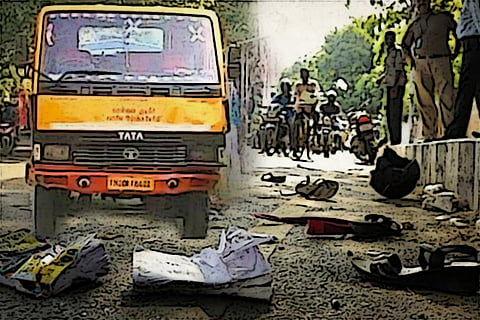

On October 13, 2016, Thursday, Rajasekaran, a police officer in the Traffic Investigation Wing of J3 police station Guindy, received a call around 3 pm about an accident near Chellammal Women’s College in Chennai. He remembers rushing to the spot only to see a gory scene - a water tanker lorry had rammed into a crowd and its driver was missing.
Three young college students were killed in the accident and four others were injured. He immediately set the ball rolling in the road accident case, which would see a verdict under three years from the date of occurrence. An FIR was registered under sections 279 (Rash driving), 304 (ii) (culpable homicide not amounting to murder), 308 (Attempt to commit culpable homicide), 337 (Causing hurt by act endangering life or personal safety of others) and 338 (Causing grievous hurt by act endangering life or personal safety of others) of the IPC.
On Thursday, a Mahila Court in Chennai convicted the driver Rajendran (44) and sentenced him to five years of imprisonment and a fine of Rs 20,500. Rajendran was arrested a day after the accident and was remanded to judicial custody. The trial in the case went on for a year after a chargesheet was filed by the police.
Obtaining a conviction in road accident cases is not an easy ask. Several factors must fall in place for the court to be convinced of the accused's guilt. Experts also say that the court awarding imprisonment to the accused is uncommon. In this case, it was meticulous police work which helped the victims' friends and families get justice for their loved ones.
Scientific evidence filed in court
Speaking to TNM, Rajasekaran, the Investing Officer in the case, said that it was the scientific evidence which the police had submitted in the court that helped the affected parties get a favourable verdict.
"We approached the case in a scientific manner and made sure our forensic evidence was perfect," he says. Explaining that forensic evidence includes the proof of vehicle accident obtained by matching the paint patches that chipped away from the lorry and got stuck on to the other vehicles which suffered damages, Rajasekaran said that the statement of the witnesses were also to the point and consistent throughout the proceedings. "That also played a major role in getting the accused convicted in this case," he points out.
Culpable homicide and not death by negligence
Rajasekaran adds that registering the FIR under section 304 (ii) of the IPC was crucial to get a conviction. “A case under this section would mean that the accused knew the consequences of his actions and still continued to do it. In this case, the driver knew that overspeeding will cause an accident and kill someone but he still did it. That is why we invoked this section of the IPC,” he explains. He also adds that this was not a case of drunk driving.
Interestingly, this is not the first conviction that Rajasekaran has managed to get in his career for road accidents. He earned a conviction in a similar case involving an MTC bus in Chennai's Flower Bazaar police district a few years ago.
"In that case, I was at the Elephant Gate Traffic Investigation Wing. As soon as the incident occurred, I went to the spot and took a lot of photographs, which I attached while filing the report on the case. Those photographs helped the honorable court realise the damage that the accident had caused and helped me secure a conviction for the accused in the case, an MTC bus driver," he recollects.
Statement of witnesses crucial for conviction
Expressing his opinion on the conviction, a senior police officer in Chennai, who didn’t want to be identified, says that to get convictions in a road accident, that too in a short span of time, many factors need to fall in place.
The statements of eye-witnesses are crucial for a case to get the accused convicted, he adds.
“Eye-witnesses and more importantly, the first responder’s deposition, is the most important aspect in securing conviction in road accident cases,” he says. First responder is the person who rescues the victim and or alerts the police about the accident.
Adding that in the given case, the friends of the victims had testified in the court, it was easy to get a verdict in favour of the victims.